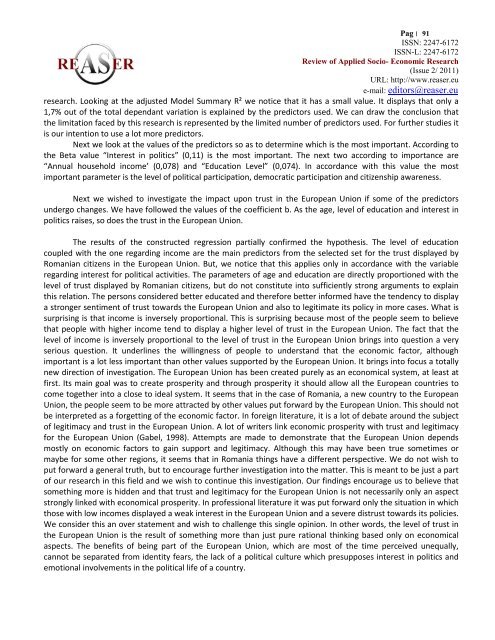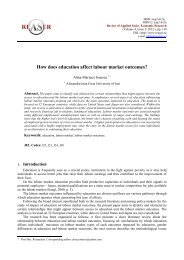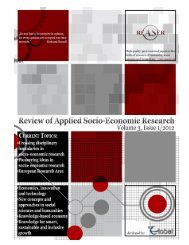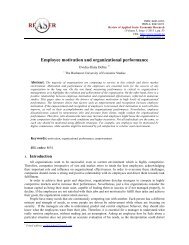Volume 2, ISSUE2/2011 - Review of Applied Socio-Economic ...
Volume 2, ISSUE2/2011 - Review of Applied Socio-Economic ...
Volume 2, ISSUE2/2011 - Review of Applied Socio-Economic ...
You also want an ePaper? Increase the reach of your titles
YUMPU automatically turns print PDFs into web optimized ePapers that Google loves.
Pag׀ 91 ISSN: 2247-6172ISSN-L: 2247-6172<strong>Review</strong> <strong>of</strong> <strong>Applied</strong> <strong>Socio</strong>- <strong>Economic</strong> Research(Issue 2/ <strong>2011</strong>)URL: http://www.reaser.eue-mail: editors@reaser.euresearch. Looking at the adjusted Model Summary R² we notice that it has a small value. It displays that only a1,7% out <strong>of</strong> the total dependant variation is explained by the predictors used. We can draw the conclusion thatthe limitation faced by this research is represented by the limited number <strong>of</strong> predictors used. For further studies itis our intention to use a lot more predictors.Next we look at the values <strong>of</strong> the predictors so as to determine which is the most important. According tothe Beta value “Interest in politics” (0,11) is the most important. The next two according to importance are“Annual household income’ (0,078) and “Education Level” (0,074). In accordance with this value the mostimportant parameter is the level <strong>of</strong> political participation, democratic participation and citizenship awareness.Next we wished to investigate the impact upon trust in the European Union if some <strong>of</strong> the predictorsundergo changes. We have followed the values <strong>of</strong> the coefficient b. As the age, level <strong>of</strong> education and interest inpolitics raises, so does the trust in the European Union.The results <strong>of</strong> the constructed regression partially confirmed the hypothesis. The level <strong>of</strong> educationcoupled with the one regarding income are the main predictors from the selected set for the trust displayed byRomanian citizens in the European Union. But, we notice that this applies only in accordance with the variableregarding interest for political activities. The parameters <strong>of</strong> age and education are directly proportioned with thelevel <strong>of</strong> trust displayed by Romanian citizens, but do not constitute into sufficiently strong arguments to explainthis relation. The persons considered better educated and therefore better informed have the tendency to displaya stronger sentiment <strong>of</strong> trust towards the European Union and also to legitimate its policy in more cases. What issurprising is that income is inversely proportional. This is surprising because most <strong>of</strong> the people seem to believethat people with higher income tend to display a higher level <strong>of</strong> trust in the European Union. The fact that thelevel <strong>of</strong> income is inversely proportional to the level <strong>of</strong> trust in the European Union brings into question a veryserious question. It underlines the willingness <strong>of</strong> people to understand that the economic factor, althoughimportant is a lot less important than other values supported by the European Union. It brings into focus a totallynew direction <strong>of</strong> investigation. The European Union has been created purely as an economical system, at least atfirst. Its main goal was to create prosperity and through prosperity it should allow all the European countries tocome together into a close to ideal system. It seems that in the case <strong>of</strong> Romania, a new country to the EuropeanUnion, the people seem to be more attracted by other values put forward by the European Union. This should notbe interpreted as a forgetting <strong>of</strong> the economic factor. In foreign literature, it is a lot <strong>of</strong> debate around the subject<strong>of</strong> legitimacy and trust in the European Union. A lot <strong>of</strong> writers link economic prosperity with trust and legitimacyfor the European Union (Gabel, 1998). Attempts are made to demonstrate that the European Union dependsmostly on economic factors to gain support and legitimacy. Although this may have been true sometimes ormaybe for some other regions, it seems that in Romania things have a different perspective. We do not wish toput forward a general truth, but to encourage further investigation into the matter. This is meant to be just a part<strong>of</strong> our research in this field and we wish to continue this investigation. Our findings encourage us to believe thatsomething more is hidden and that trust and legitimacy for the European Union is not necessarily only an aspectstrongly linked with economical prosperity. In pr<strong>of</strong>essional literature it was put forward only the situation in whichthose with low incomes displayed a weak interest in the European Union and a severe distrust towards its policies.We consider this an over statement and wish to challenge this single opinion. In other words, the level <strong>of</strong> trust inthe European Union is the result <strong>of</strong> something more than just pure rational thinking based only on economicalaspects. The benefits <strong>of</strong> being part <strong>of</strong> the European Union, which are most <strong>of</strong> the time perceived unequally,cannot be separated from identity fears, the lack <strong>of</strong> a political culture which presupposes interest in politics andemotional involvements in the political life <strong>of</strong> a country.








